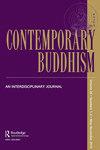FUNDAMENTAL INTELLIGENCE, A BUDDHIST JUSTIFICATION FOR THE UNIVERSAL PRINCIPLES UNDERLYING IHL
IF 0.1
3区 哲学
0 PHILOSOPHY
引用次数: 0
Abstract
ABSTRACT All of us agree that a civilian population is inevitably and profoundly affected by a war, regardless of where this population stands in the scheme of things. A civilian population is hostage to the forces at work, not only physically, economically and socially, but also intimately, emotionally, psychologically and spiritually. In fact, everyone involved in a conflict has to deal with the chaos in his or her own mind and in his or her own environment. The formulation of international humanitarian law (IHL) was influenced by a socially oriented intellectual culture that has often failed to address the inner workings of the individual consciousness. Buddhism’s contribution here may be just that: its insistence on the process of cognition as the ground for both the creation of and the liberation from suffering. More specifically, this paper focuses on the Dharmadharmatāvibhāga (DDV), an ancient North Indian Buddhist text. The premise is that many such ancient texts have something important to contribute to our contemporary world, by offering some insight into ‘universal principles’ in the workings of the mind and in human interactions. The question then is: how can these ideas contribute to the development of individual willingness to care and embody ethical conduct even during armed conflicts?基本智慧,佛教对IHL普遍原则的解释
摘要我们所有人都同意,平民人口不可避免地会受到战争的深刻影响,无论他们在战争中的地位如何。平民人口不仅在身体、经济和社会上,而且在情感、心理和精神上都受制于工作中的部队。事实上,参与冲突的每个人都必须处理自己头脑和环境中的混乱。国际人道主义法的制定受到以社会为导向的知识文化的影响,这种文化往往未能解决个人意识的内部运作问题。佛教在这方面的贡献可能只是:它坚持将认知过程作为创造和解脱痛苦的基础。更具体地说,本文关注的是北印度古代佛教文本《佛法》。前提是,许多这样的古代文本通过深入了解思维和人类互动中的“普遍原则”,为我们的当代世界做出了重要贡献。那么,问题是:即使在武装冲突期间,这些思想如何有助于培养个人关心和体现道德行为的意愿?
本文章由计算机程序翻译,如有差异,请以英文原文为准。
求助全文
约1分钟内获得全文
求助全文

 求助内容:
求助内容: 应助结果提醒方式:
应助结果提醒方式:


